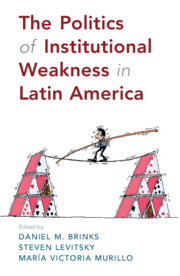Book contents
- The Politics of Institutional Weakness in Latin America
- The Politics of Institutional Weakness in Latin America
- Copyright page
- Contents
- Figures
- Maps
- Tables
- Contributors
- Acknowledgments
- 1 The Political Origins of Institutional Weakness
- 2 When (Electoral) Opportunity Knocks
- 3 The Stickiness of “Bad” Institutions
- 4 Presidential Crises in Latin America
- 5 Coercion Gaps
- 6 Aspirational Laws as Weak Institutions
- 7 The Social Determinants of Enforcement
- 8 A Multilevel Approach to Enforcement
- 9 What/Whose Property Rights?
- 10 Imported Institutions
- 11 Social Origins of Institutional Strength
- 12 Conclusion
- Bibliography
- Index
6 - Aspirational Laws as Weak Institutions
Legislation to Combat Violence against Women in Mexico
Published online by Cambridge University Press: 06 May 2020
- The Politics of Institutional Weakness in Latin America
- The Politics of Institutional Weakness in Latin America
- Copyright page
- Contents
- Figures
- Maps
- Tables
- Contributors
- Acknowledgments
- 1 The Political Origins of Institutional Weakness
- 2 When (Electoral) Opportunity Knocks
- 3 The Stickiness of “Bad” Institutions
- 4 Presidential Crises in Latin America
- 5 Coercion Gaps
- 6 Aspirational Laws as Weak Institutions
- 7 The Social Determinants of Enforcement
- 8 A Multilevel Approach to Enforcement
- 9 What/Whose Property Rights?
- 10 Imported Institutions
- 11 Social Origins of Institutional Strength
- 12 Conclusion
- Bibliography
- Index
Summary
In the past four decades, governments around the world have embraced principles of gender equality. Democratic transitions, feminist movements, international norms, lobbying by politicians, partisan competition, technocratic decision-making, regional and global diffusion, and varying combinations of these and other factors have pushed countries to grant women and other marginalized groups equal rights and greater recognition. Governments have reformed laws and adopted policies in many areas, including violence against women, maternity and parental leave, presence in political decision-making, egalitarian family law, abortion, reproductive health, and workplace equality. Still, there is significant cross-national variation in the timing and extent of change (see Htun and Weldon 2018).
- Type
- Chapter
- Information
- The Politics of Institutional Weakness in Latin America , pp. 141 - 160Publisher: Cambridge University PressPrint publication year: 2020
- 4
- Cited by

